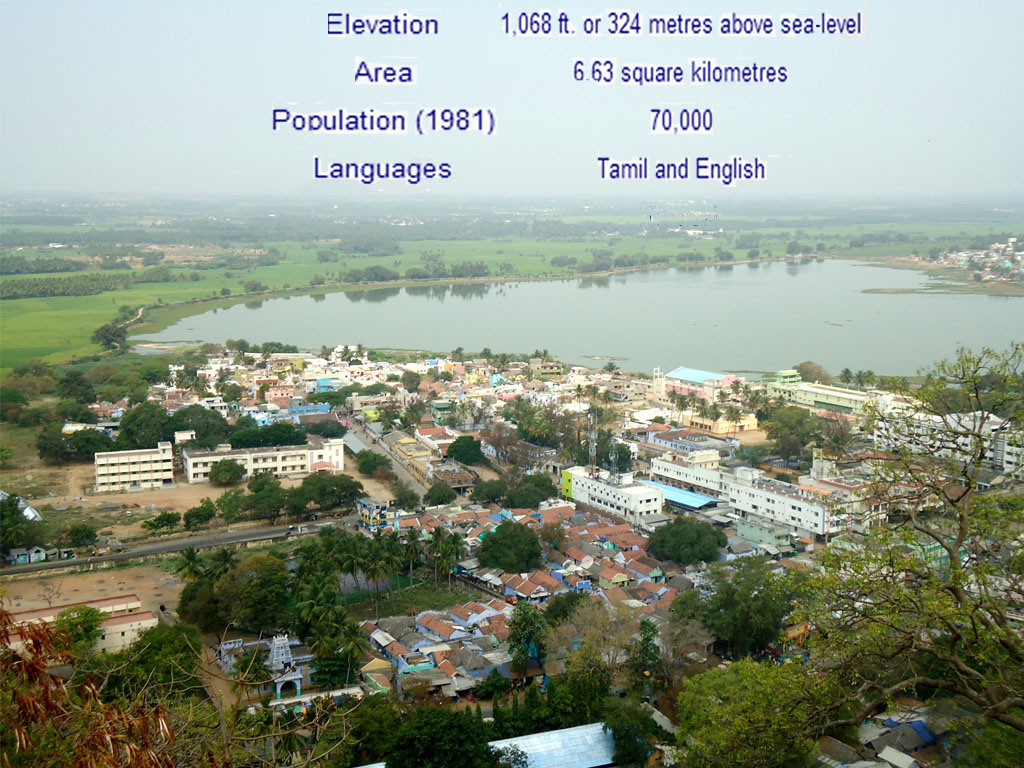


In 18th century history comes from the records of Hyder Ali and his son, Tippoo Sultaun, which was handed over to the British on the surrender of the Dindigul district after the Third Anglo-Mysore War. poligars or palayakarars ruled the palani in that period.
Considering the fact that there are numerous people of the Nayakar caste who claim descent from what is modern-day Andhra Pradesh and who retain some vestiges of the Telugu tongue, in Balasamudram, it is more than probable that their forebears were given charge of the fort of that place by the kings of Madurai and retained its control long after their sovereigns had been displaced.
Palani is one of the most sacred shrines of the God Muruga. Palani is the third Padai Veedu. The other names of Pazhani are Sivagiri and Sivamalai.
Palani is located at the district of Dindigul about 54km in western Tamil Nadu. While Sri Dandayudhapani blesses devotees from the hill top, there is a more ancient Muruga temple at the foot of the hill, which is called "Tiruvavinankudi".
It is believed that sage Agasthya did penance at Thiruvavinankudi and learned the five grammars of Tamil language under Lord Muruga's expert tutelage.
Palani is a holiest resort for all the devotees of LORD MURUGAN.The shrine of lord Arulmigu dandayudhapani swami is at the top of the hill nearly 500feet high, but there are several god and goddess surrounding the hill itself. Devotees reach the shrine either by climbing the fight of the steps or travel by the winches.
Devotees believe that Lord Murugan came to this scared place. Narada Muni, a sage, brought a golden mango to the divine court of Lord Shiva and Parvathi and gave the miraculous fruit Jnanapalam to them but they announced whoever completes a round of globe first will get the fruit. Lord Murugan moves fastly with his peacock.
Lord vinayakar symbolize his parents as a world, so he circumbulated around them and got the fruits. Murugan thought he was cheated. He decided to leave them so pravathi calls Murugan as "Pazham Nee". Hence Palani gain its popularity.
Devotee's offers kavadis, tonsure ceremony, Annadanam, drop money in hundial to lord. Murugan is fond of panchamirtham. Thaipusam, vaikasi Vishakam, Thirukarttikai are the famous festivals as per the request of the devotees golden chariot is made. Palani is one of the revered 6 padai veedu shrines of murugan.
In the Adivaram or the foothills there are many shops selling all kinds of things. It is quite fascinating to go around and look even if you do not want to shop for something particular. Photos, idols, Vibuthi (sacred ash), vermillion powder, bangles, toys and other things for children and much more are available at very reasonable rates. It is fun to walk around the whole area
Palani is a centre of a form of traditional Indian medicine known as Siddha Vaidyam, said to have been developed by the ascetics resident, in prehistoric times, in the hills about the modern-day town. Further, the town is also the centre for production of Vibhuti (sacred ash) and pancha amritham (literally, 'the five nectars' - a traditional preparation of fruit pulp and molasses), both of which are considered holy and distributed to devotees after being offered to the Lord Subrahmanyan in the hill-temple.
Palani is the headquarters of the Taluk in Dindigul District. Its importance is mainly due to the location of the Temple of " LORD MURUGA " ( Subramanya ) Today it is a major pilgrim centre of South India next to Tirupathy and Sabarimalai.
Palani is one of the 38 heritage towns identified by the Government of Tamil Nadu. Out of which 11 towns are prioritized for assessing the developmental needs keeping pilgrims and tourists as the main beneficiaries. Besides being an important religious centre, the town also functions as Taluk head quarters with a Population of 67231 as per 2001 census covering an area of 6.63 sq. kms. More than two thirds of the population are literate.
This town has a floating pilgrim population of about 10000 to 12000 during normal days and about 5 to 10 lakhs during special religious festival days.
The Town has 18 Lodges with 739 rooms 1248 beds, 34 Choultries with 109 rooms with a capacity of 10100 persons . There are 46 Kalyanamandapams apart from 4 Devasthanam choultries and 73 various caste madams.